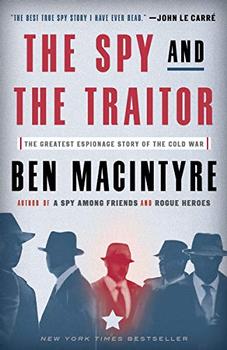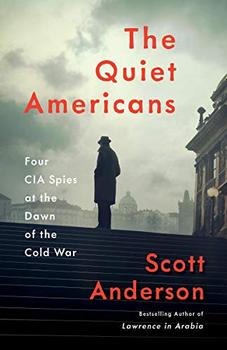Summary | Excerpt | Reviews | Beyond the book | Read-Alikes | Genres & Themes | Author Bio

The Greatest Espionage Story of the Cold War
by Ben MacintyreFor over a decade, Oleg Gordievsky of the Soviet Union was a double-agent for the British, climbing the rungs of the Soviet KGB's political ladder while supplying the British MI6 with increasingly valuable information. Because of his impeccable language skills and his status as the son of a loyal KGB member, Gordievsky rose through the ranks of the organization with hardly a mark on his record, and seemed an unlikely candidate for treason. However, after witnessing the murder of innocent people trying to escape East Germany during the construction of the Berlin Wall in 1961 and uncovering the violence of the Soviet invasion of Czechoslovakia in 1968, Gordievsky sought new alliances in the West.
With his training in spycraft and a prodigious ability to retain, repeat and analyze dense intelligence information, Gordievsky is considered to be one of the most impressive and valuable double agents of the Cold War. He transferred thousands of documents to the British and provided hours upon hours of insight into the inner-workings of the KGB and Soviet Union. Gordievsky's contributions shaped history, aiding in the ejection of KGB spies who had infiltrated nations around the world. Of equal importance, Gordievsky's intimate understanding of the Soviet perspective fostered close relationships between himself and Western powers, wherein he advised top government officials on how to engage with the Soviet government during the Cold War. Both Ronald Reagan and Margaret Thatcher met with Gordievsky to discuss issues like the space race and the escalation of nuclear armament after he fled the USSR.
In 1985, after an information leak, Gordievsky was threatened with execution by the KGB. Facilitating an unlikely, miraculous escape plan called PIMLICO, the MI6 helped evacuate Gordievsky—and eventually his wife and two daughters—out of the Soviet Union and into British care. No one had ever been smuggled out of the Soviet Union before, and project PIMLICO hinged on a number of "what-ifs" that could easily have collapsed, costing Gordievsky his life. The suspense builds as Macintyre describes the intricate plan, down to the brand of chocolate bar that would signal a message received (Kit Kat or Mars) to the type of bag Gordievsky would use to initiate contact (Safeway) before traveling from the Soviet Union to Finland, passing five layers of border control while locked in a trunk. As Macintyre writes, "Outside fiction, spying rarely goes according to plan," a testament to the tension in these moments scattered throughout the book.
Contemporary spy stories are seldom conveyed with such accuracy and depth, since the documents pertinent to these cases are confidential, stored in intelligence agency archives around the world. However, in interviewing all of the officers involved in the case, including Gordievsky, Macintyre brings new information to the public about this concealed moment in international history. Herein lies the greatest strengths and weaknesses of the book: Although it is loaded with original, gripping information, the level of detail can be tedious to work through, particularly during lulls in Gordievsky's career. Governments and intelligence agencies are riddled with bureaucratic layers, the nuances of which are detailed in this book, weighing down the prose. Ultimately, this journalistic-historic approach pays off when Macintyre notes which Western political figures were entangled with the KGB and how contemporary leaders like Vladimir Putin fit into the tales of decades past.
Unlike many cut-and-dry renditions of history, The Spy and the Traitor approaches fact with style. By using Oleg Gordievsky's frame of reference as a funnel through which to explore espionage, international politics and the Cold War, Macintyre incorporates elements of literary finesse. Gordievsky's favorite censored writers and composers become allusions in the text, as the author references William Shakespeare's Hamlet and Somerset Maugham's short story "Mr. Harrington's Washing." Extended metaphors about long distance running and romance permeate the chapters, too. It is clear that Gordievsky's rebellion against the Soviet Union was as much an act of defiance against Russian culture as it was against Russian politics. Highly critical of the state-sanctioned censorship in Russia that limited his access to books, music, consumer goods and ideas, Gordievsky grew to resent the constant surveillance and control embedded in Russian society. This is an observation Macintyre explores in depth, noting the evolution of Gordievsky's character development in relation to his cultural and political awakening.
The Spy and the Traitor will appeal to readers with an interest in nonfiction books about politics and international affairs, as well as those who enjoy thrillers and crime fiction. Macintyre's prose reads somewhat like a novel, conjuring images with historical detail and weaving in illuminating symbols and allusions.
![]() This review was originally published in The BookBrowse Review in October 2018, and has been updated for the
December 2018 edition.
Click here to go to this issue.
This review was originally published in The BookBrowse Review in October 2018, and has been updated for the
December 2018 edition.
Click here to go to this issue.

If you liked The Spy and the Traitor, try these:

by Ronald Drabkin
Published 2025
In the spirit of Ben Macintyre's greatest spy nonfiction, the truly unbelievable and untold story of Frederick Rutland—a debonair British WWI hero, flying ace, fixture of Los Angeles society, and friend of Golden Age Hollywood stars—who flipped to become a spy for Japan in the lead-up to the attack on Pearl Harbor.

by Scott Anderson
Published 2021
From the bestselling author of Lawrence in Arabia, a gripping history of the early years of the Cold War, the CIA's covert battles against communism, and the tragic consequences which still affect America and the world today.
Your guide toexceptional books
BookBrowse seeks out and recommends the best in contemporary fiction and nonfiction—books that not only engage and entertain but also deepen our understanding of ourselves and the world around us.